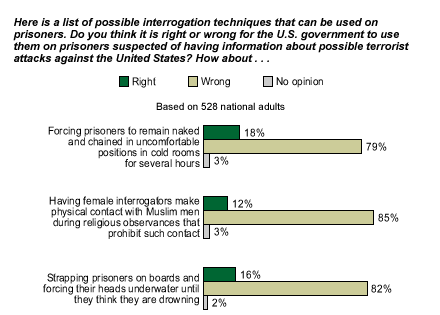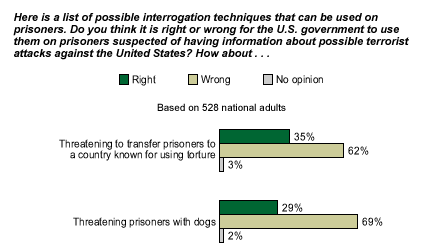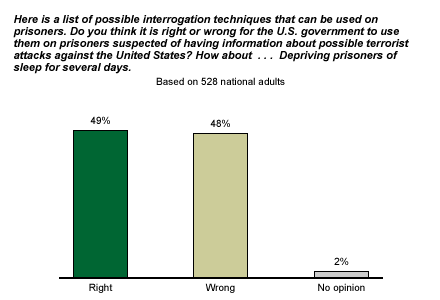Whether they are viewed online, in newspapers, or on television, images of military prisoner interrogation and abuse -- like the now-infamous photos of the abuse at Abu Ghraib -- are hard to look at and difficult to forget. The events surrounding the Abu Ghraib scandal and the trials of U.S. and British soldiers involved brought public attention to the interrogation techniques used on prisoners. In many cases, soldiers have blamed commanding officers and military intelligence officials, who allegedly ordered the abuse, citing the need to break detainees' will to extract information.
A recent CNN/USA Today/Gallup poll* asked Americans how they feel about using some controversial interrogation techniques on prisoners suspected of having information about possible terrorist attacks against the United States. By and large, a majority of Americans think it's wrong for the government to use any of these methods, even on these prisoners.
Clearly Wrong
Three of the interrogation techniques Gallup asked about were deemed "wrong" by substantial majorities of the American public. A method involving violation of religious beliefs garners the most distaste -- more than 8 in 10 Americans (85%) consider it wrong to have "female interrogators make physical contact with Muslim men during religious observances that prohibit such contact." Only 12% feel it would be right to use this tactic.
Two other methods considered wrong by roughly 80% of the public involve physical torment. Eighty-two percent of Americans think "strapping prisoners to boards and forcing their heads underwater until they think they are drowning" is wrong, and 79% consider "forcing prisoners to remain naked and chained in uncomfortable positions in cold rooms for several hours" to be wrong. Less than 20% of Americans believe these practices are right for the government to use on those with information about terror plots.

Two other practices -- both centered around threatening -- are condemned by roughly two-thirds of the American public. Sixty-nine percent of Americans think it's wrong to threaten prisoners with dogs, while 29% think it's right to use that technique. "Threatening to transfer prisoners to a country known for using torture" is considered wrong by 62% of Americans, and right by 35%.

One Technique Borders on Public Approval
Sleep deprivation is the one interrogation method that draws a nearly even split between support and opposition. Specifically, 49% believe depriving prisoners believed to have knowledge of terror attacks of sleep for several days is right, while 48% consider it wrong.

The Gender Gap
Men are more likely than women to support using these interrogation methods on suspected terrorists. More than half of men (55%) say it is right to deprive such prisoners of sleep, compared with 43% of women. Four in 10 men (43%) say threatening prisoners with transfer to a country known for using torture is right, compared with 28% of women, and a third (36%) say threatening prisoners with dogs is right, compared with 23% of women.
*These results are based on telephone interviews with a randomly selected national sample of 528 adults, aged 18 and older, conducted Jan. 7-9, 2005. For results based on this sample, one can say with 95% confidence that the maximum error attributable to sampling and other random effects is ±5 percentage points. In addition to sampling error, question wording and practical difficulties in conducting surveys can introduce error or bias into the findings of public opinion polls.
